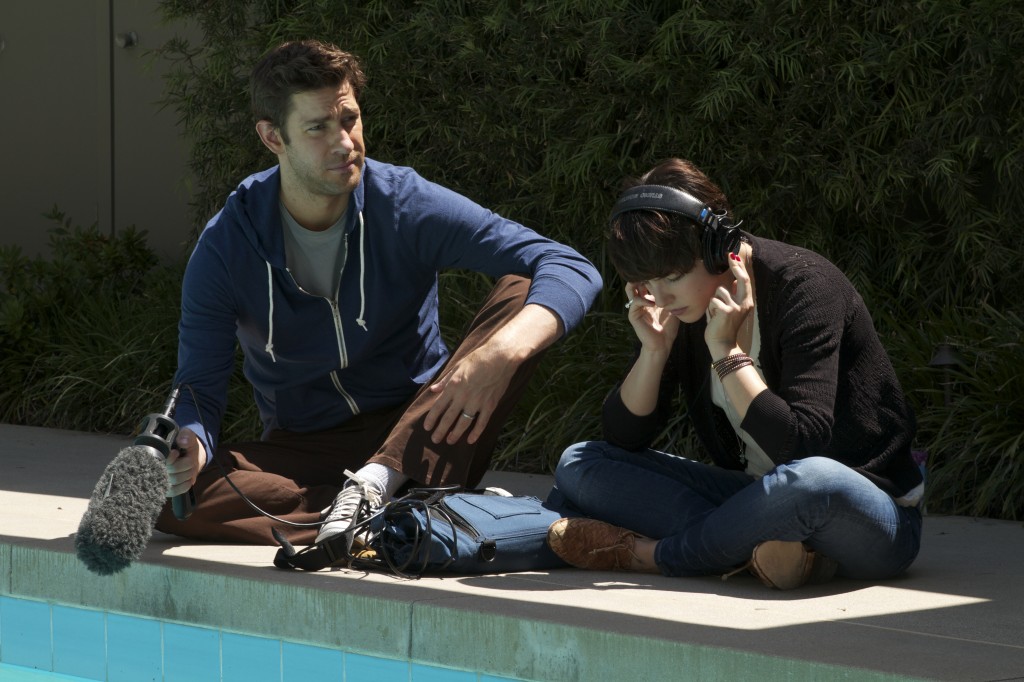Nobody Walks
reviewed by Kyle Taubken
Ry Russo-Young’s newest film, Nobody Walks, has more potential than any other indie drama this year. The film boasts talent both behind and in front of the camera: the script was co-written by the director herself and Lena Dunham, of Tiny Furniture and HBO’s Girls fame; it stars John Krasinski, Olivia Thirlby, and Rosemary DeWitt; and it was shot by Christopher Blauvelt, who captured the beautifully stark Meek’s Cutoff. Thus, this film has all the markings of something offbeat and possibly original. Unfortunately, these elements add up to nothing more than a bit of a disappointment. The plot weaves haphazardly through several stories of sexual temptation and inevitable infidelity, regrettably never stopping long enough at any of them to explore their understated complexity.
In the center are Peter (Krasinski) and Martine (Thirlby), whose scenes are the real reason to see this film. The two actors’ performances are subtly unnerving, and the major crime of the film is that their story is just one of several. It is certainly the most complex and interesting, pitting the settled and happily married Peter against the young and free spirited Martine. Peter is a sound designer whom Martine hires to flesh out the sound on her upcoming video installation. Locking them in a sound proof mixing room for hours on end, Young creates so much believable sexual tension that most viewers will feel relieved when the two of them finally give in to one another. Peter becomes a man obsessed, yet Martine is only toying with him. The most riveting scene of the film finds Peter confronting Martine in his pool house where she is staying while the two work on her video art. Peter confesses that he can’t get her out of his head and blames her for his infidelities. Martine wants nothing to do with this drama, claiming, “Dude. You’re married.” Thirlby reeks blasé and that statement only further ignites Peter. That’s the movie I want to watch.
Unfortunately, Young and, presumably, Dunham, give far too much screen time to the secondary relationships like Peter’s assistant and stepdaughter, Peter’s assistant and Martine, Peter’s stepdaughter and her Italian teacher, Peter’s psychiatrist wife (DeWitt) and her screenwriter patient, and Peter’s wife and her ex-husband. Yes, it really gets that convoluted. Krasinki, Thirlby, and DeWitt have enough bravado to carry the whole film, and if Young could have stuck with that trio’s dynamic—the classic love triangle—she may have had a shot at creating something really interesting. Instead she seems preoccupied with making some larger statement about the desires of all people at all ages for something they can’t have. Maybe Young thinks the grass is always greener. In sprawling an otherwise scant script over a short running time, however, Young pigeonholes herself into a struggle to address each relationship equally, a task that becomes impossible and mortally wounds the rest of the film.
Published December 3, 2012.
Kyle Taubken was raised in northern Mississippi, near Memphis, Tennessee. Always interested in theater, literature, and film, he began acting in high school theater before moving into film editing early in his undergrad career. Beginning in TV news, he decided to venture into narrative film, writing and directing five short films from 2008-2011 before beginning graduate school. Taubken holds a B.A. in Mass Media from Freed-Hardeman University in Henderson, TN, and is pursuing an M.F.A. in Film and Television Production and an M.A. in Cinema Studies from the Savannah College of Art and Design in Savannah, GA. He continues to write, direct, edit, and produce personal films alongside films assigned as class projects.

